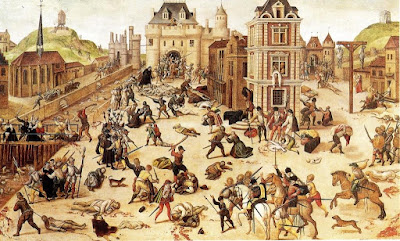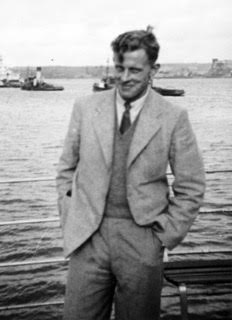An East Budleigh anthem
The St Bartholomew's Day Massacre of 1572, a painting by the French Huguenot François Dubois (1529–1584)
Elsewhere on this blog I posted my editorial 'Remaining Thoughts', published in the Autumn 2016 Fairlynch Museum newsletter The Primrose.
As I wrote it, I had various things in mind, including the little-known story of East Budleigh's Huguenot refugee Daniel Caunières (1661-1739). He was appointed as vicar in 1689, four years after the Revocation of the Edict of Nantes during the reign of Louis XIV.
Caunières went on to become Rector of Filleigh, near Barnstaple in 1704. He was appointed on 10 March 1722 as chaplain to 27-year-old Lord Hugh Fortescue (1695-1751), later to become 14th Baron Clinton.
My little piece of bloggerel can be sung to the tune of 'La Marseillaise'.
(My words are much nicer).
We’re going to sing a song of freedom
Of bravery and liberty;
Of Daniel Caunières, a Frenchman,
Who found himself a refugee.
It’s a story worth the telling
It’s a piece of true history.
It’s a piece of true history.
‘Twas a time of cruel persecution
When minorities were often forced to flee,
In times of prejudice and strife,
And many years before the Revolution.
How sad
The world can be,
When people
Disagree!
Let’s hope, one day,
We all must pray,
They’ll think like you and me!
It was a time of persecution
During the reign of King Louis.
He made life difficult for Huguenots
Passing a most unjust decree.
Daniel just wanted freedom
So he had to cross the sea.
He had to cross the sea.
It was a desperate solution
As we’re sure that you will all agree.
But human rights did not exist,
For this was years before the Constitution.
To Exeter
He came.
He didn’t
Change his name.
Let’s hope, one day,
We all must pray,
That things won’t be the same.
And if you visit All Saints Church today
The parish church of East Budleigh.
You’ll find the name of Daniel Caunières;
He was no vicar absentee.
It’s the village that is famous
As the home of Sir Walter Ralegh.
As the home of Sir Walter Ralegh.
Reverend Daniel made his contribution
To the land of hope and glory and the free.
He served as vicar many years,
Though sermons may have needed elocution.
His story
We declaim.
It needs
A bit of fame.
A new homeland,
Where he could stand
For freedom and its flame.
Below are the words of
the first verse of 'La Marseillaise', the French national anthem.
Allons
enfants de la Patrie,
Le jour de gloire est arrivé!
Contre nous de la tyrannie,
L'étendard sanglant est levé, (bis)
Entendez-vous dans les campagnes
Mugir ces féroces soldats?
Ils viennent jusque dans vos bras
Égorger vos fils, vos compagnes!
Aux armes, citoyens,
Formez vos bataillons,
Marchons, marchons!
Qu'un sang impur
Abreuve nos sillons!
Le jour de gloire est arrivé!
Contre nous de la tyrannie,
L'étendard sanglant est levé, (bis)
Entendez-vous dans les campagnes
Mugir ces féroces soldats?
Ils viennent jusque dans vos bras
Égorger vos fils, vos compagnes!
Aux armes, citoyens,
Formez vos bataillons,
Marchons, marchons!
Qu'un sang impur
Abreuve nos sillons!




Comments
Post a Comment